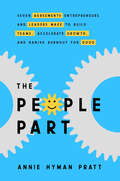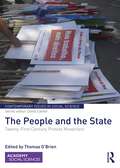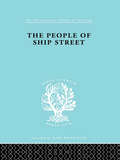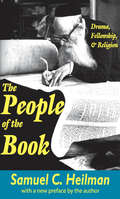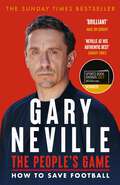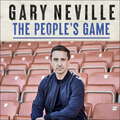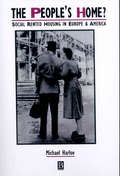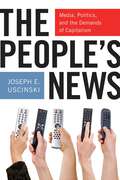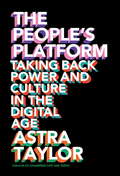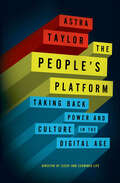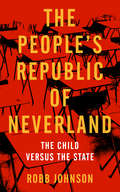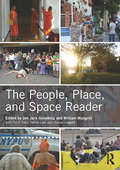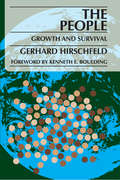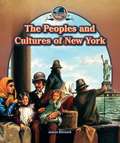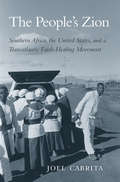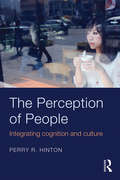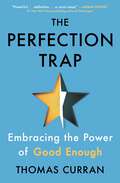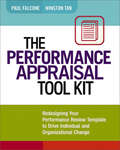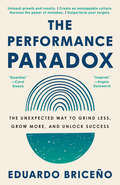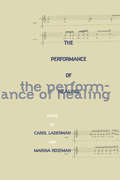- Table View
- List View
The People Part: Seven Agreements Entrepreneurs and Leaders Make to Build Teams, Accelerate Growth, and Banish Burnout for Good
by Annie Hyman PrattIn the spirit of The One Thing and Start with Why, this guide provides the "missing link" for entrepreneurs to generate fast, sustainable growth, get out of the weeds, and build their A-teams from the inside out.Success in business today means responding to change at an ever-increasing pace—due to factors such as competition, evolving technology, and increasing client expectations. Delivering more value with fewer resources is the name of the game. However, in this environment, even when a business is winning, the leaders and teams playing the game often feel like they are losing—plagued by overwhelm and burnout. Most business books try to address this problem with systems, structures, and values. What&’s missing? The &“People Part&”—the often-misunderstood area of a business where leaders and team members do the actual thinking, interacting, and performing together. Drawing on Annie&’s 30 years of working with humans in business, this dynamic and engaging book outlines seven easy-to-implement agreements to build a high-performance team. You&’ll learn how to: • Lead in a way that supports others to perform at their best, by strengthening your own Self-Leadership • Generate a leadership reputation where the best A Players seek to work with you, and stay for the long term • Create psychological safety—the environment that empowers team members to collaborate at the highest levels • Develop leaders and team members to take on responsibilities with the same commitment level as the owners • Supercharge your team productivity with Annie&’s signature tools • Put the seven agreements to work and see improvements right away If you&’re an entrepreneur just starting out . . . a CEO trying to get out of the weeds to work &“on&” rather than &“in&” your business . . . a leader who needs a breakthrough for themselves and their team . . . or a team member wanting to make your best contribution yet . . . then The People Part is for you.
The People and the State: Twenty-First Century Protest Movement (Contemporary Issues in Social Science)
by Thomas O’BrienProtest has proliferated in the early part of the twenty-first century, forcing change in political systems and challenging established patterns of behaviour. The factors driving these protests range from religion and inequality through to the effectiveness of the state and its role in protecting the rights of citizens. The growth in discontent represented by these protests potentially threatens the stability of the state by raising questions about the right of governments to govern. Anger and frustration embodied in many of these actions has resulted in the growth of support for populist political actors promising simplified solutions to the complex underlying issues. In this way, the inability of the state to address the claims of its population potentially places its continued viability at risk. The cases in this collection examine a range of protest movements from around the world, in both democratic and authoritarian political systems, to provide an overview of contemporary issues and protest forms. Addressing contemporary protest in this manner is an important task in supporting our understanding of the root causes of the current tensions and their possible future effects. This book is a compilation of articles from a special issue of Contemporary Social Science with additional papers selected from Contemporary Politics, Journal of Contemporary China and Democratization.
The People of Ship Street (International Library of Sociology #Vol. 14)
by Madeline KerrFirst published in 1998. Routledge is an imprint of Taylor & Francis, an informa company.
The People of the Book: Drama, Fellowship and Religion
by Samuel C. HeilmanJudaism has long derived its identity from its sacred books. The book or scroll--rather than the image or idol--has been emblematic of Jewish faith and tradition. The People of the Book presents a study of a group of Orthodox Jews, all of whom live in the modern world, engaged in the time-honored practice of lernen, the repeated review and ritualized study of the sacred texts. In preserving one of the activities of Jewish life, Samuel C. Heilman argues, these are the genuine -People of the Book.- For two years, Heilman participated in and observed five study circles in New York and Jerusalem engaged in the avocation of lernen the Talmud, the great corpus of Jewish law, lore, and tradition. These groups, made up of men who felt the ritualized study of sacred texts to be not only a religious obligation but also an appealing way to spend their evenings, weekends, and holidays, assembled together under the guidance of a teacher to review the holy books of their people. Having become part of this world, the author is able to provide first-hand observation of the workings of the study circle. Heilman's study moves beyond the merely descriptive into an analysis of the nature and meaning of activity he observed. To explain the character and appeal of the study groups, he employs three concepts: drama, fellowship, and religion. Inherent to the life of the study circle are various sorts of drama: -social dramas- playing out social relationships, -cultural performances- reenacting the Jewish world view, and -interactional dramas- and -word plays- involving the intricacies of the recitation and translation process. This book will be of interest to anthropologists and those interested in the academic study of religion.
The People's Game
by Alan McdougallSport in East Germany is commonly associated with the systematic doping that helped to make the country an Olympic superpower. Football played little part in this controversial story. Yet, as a hugely popular activity that was deeply entwined in the social fabric, it exerted an influence that few institutions or pursuits could match. The People's Game examines the history of football from the interrelated perspectives of star players, fans, and ordinary citizens who played for fun. Using archival sources and interviews, it reveals football's fluid role in preserving and challenging communist hegemony. By repeatedly emphasising that GDR football was part of an international story, for example, through analysis of the 1974 World Cup finals, Alan McDougall shows how sport transcended the Iron Curtain. Through a study of the mass protests against the Stasi team, BFC, during the 1980s, he reveals football's role in foreshadowing the downfall of communism.
The People's Game: A View from a Front Seat in Football
by Gary Neville*OUT NOW*'Neville at his authentic best. [He] is the closest thing to a spokesman there is for English football.' Sunday Times 'Brilliant.' Mail on Sunday'Gary Neville usually talks a lot of sense, and writes it too . . . Neville's words are timely.' Henry Winter, The Times __________The beautiful game is under threat. The greed and selfishness of the biggest clubs is harming the sport, with smaller clubs struggling for financial survival and supporters being left behind.It's time to fix football. __________Football is the people's game. A sport accessible to everyone and enjoyed by millions around the world.But football is broken. Beneath the glamourous sheen of the Premier League, it's a game that's rusting and rotten. The growing influence and wealth of the biggest teams is harming the game, leaving fans out of pocket and smaller clubs clinging to survival. The European Super League, which looked to eradicate competition in favour of guaranteed profits, was just the beginning. This isn't what football is about. Something's got to change. Enough is enough. Gary Neville has had a front-row seat in football for over 30 years, witnessing the sport at every level - as a player, a coach, a pundit and an owner. Most of all, he's a fan. Shocked by the state of the game, Gary looks to find out how we got into this mess, who's responsible, and what we can do about it. The People's Game is Gary's vision for a brighter future. Drawing on interviews with those at the epicentre of the sport's biggest issues - from the role of ownership to the lack of funding in the football league, the rise in racism, ownership models and the future of the women's game - he explains how football has sleepwalked into this mess and offers a new path forward. With stories from his own playing career, as well as insight into some of the biggest footballing decisions in recent history, this is a total look at the game today. This is a passionate, personal and critical account of how football lost its soul, and what we can do to get it back. __________
The People's Game: A View from a Front Seat in Football
by Gary Neville*AVAILABLE FOR PRE-ORDER NOW*'Gary Neville usually talks a lot of sense, and writes it too . . . Neville's words are timely.' Henry Winter, The Times'Brilliant.' Mail on Sunday'Neville at his authentic best. [He] is the closest thing to a spokesman there is for English football.' Sunday Times __________The beautiful game is under threat. The greed and selfishness of the biggest clubs is harming the sport, with smaller clubs struggling for financial survival and supporters being left behind.It's time to fix football. __________Football is the people's game. A sport accessible to everyone and enjoyed by millions around the world.But football is broken. Beneath the glamourous sheen of the Premier League, it's a game that's rusting and rotten. The growing influence and wealth of the biggest teams is harming the game, leaving fans out of pocket and smaller clubs clinging to survival. The European Super League, which looked to eradicate competition in favour of guaranteed profits, was just the beginning. This isn't what football is about. Something's got to change. Enough is enough. Gary Neville has had a front-row seat in football for over 30 years, witnessing the sport at every level - as a player, a coach, a pundit and an owner. Most of all, he's a fan. Shocked by the state of the game, Gary looks to find out how we got into this mess, who's responsible, and what we can do about it. The People's Game is Gary's vision for a brighter future. Drawing on interviews with those at the epicentre of the sport's biggest issues - from the role of ownership to the lack of funding in the football league, the rise in racism, ownership models and the future of the women's game - he explains how football has sleepwalked into this mess and offers a new path forward. With stories from his own playing career, as well as insight into some of the biggest footballing decisions in recent history, this is a total look at the game today. This is a passionate, personal and critical account of how football lost its soul, and what we can do to get it back. __________
The People's Game: THE SUNDAY TIMES BESTSELLER
by Gary NevilleA PASSIONATE AND PERSONAL ACCOUNT OF HOW FOOTBALL HAS LOST ITS SOUL BY FORMER PLAYER AND LEADING PUNDIT, GARY NEVILLE. __________The beautiful game is under threat. The greed and selfishness of the biggest clubs is harming the game - leaving other clubs struggling for financial survival and supporters behind.It's time to fix football. __________Football is the people's game. A sport accessible to everyone and enjoyed by millions around the world. But football is broken. Beneath the glamorous sheen of the Premier League, it's a game that's rusting and rotten. The growing influence and wealth of the biggest teams is harming the game, leaving fans out of pocket and other clubs clinging to survival. This isn't what football is about.Gary Neville has had a front-row seat in football for over 30 years, witnessing the sport at every level - as a player, a coach, a pundit and an owner. Most of all, he's a fan.The People's Game is Gary's vision for a brighter future. Drawing on interviews with those at the epicentre of the sport's biggest issues - from the role of ownership to the lack of funding in the football league, the rise in racism and the future of the women's game - he explains how football has sleepwalked into this mess and offers a new way forward. With stories from his own playing career, as well as insight into some of the biggest footballing decisions in recent history, this is a total look at the game today.This is a passionate, personal and critical account of how football lost its soul, and what we can do to get it back.__________(P)2022 Hodder & Stoughton Limited
The People's Home?: Social Rented Housing in Europe and America (IJURR Studies in Urban and Social Change Book Series)
by Michael HarloeThe People's Home is a magisterial examination of the development of social rented housing over the last hundred years in six advanced capitalist countries - Britain, France, Germany, the Netherlands, Denmark and the USA.
The People's Money: Pensions, Debt, and Government Services (The Urban Agenda #21)
by Michael A. PaganoAmerican cities continue to experience profound fiscal crises. Falling revenues cannot keep pace with the increased costs of vital public services, infrastructure development and improvement, and adequately funded pensions. Chicago presents an especially vivid example of these issues, as the state of Illinois's rocky fiscal condition compounds the city's daunting budget challenges.In The People's Money, Michael A. Pagano curates a group of essays that emerged from discussions at the 2018 UIC Urban Forum. The contributors explore fundamental questions related to measuring the fiscal health of cities, including how cities can raise revenue, the accountability of today's officials for the future financial position of a city, the legal and practical obstacles to pension reform and a balanced budget, and whether political collaboration offers an alternative to the competition that often undermines regional governance.Contributors: Jered B. Carr, Rebecca Hendrick, Martin J. Luby, David Merriman, Michael A. Pagano, David Saustad, Casey Sebetto, Michael D. Siciliano, James E. Spiotto, Gary Strong, Shu Wang, and Yonghong Wu
The People's News: Media, Politics, and the Demands of Capitalism
by Joseph E. UscinskiUncovers the surprising cause behind the recent rise of fake newsIn an ideal world, journalists act selflessly and in the public interest regardless of the financial consequences. However, in reality, news outlets no longer provide the most important and consequential stories to audiences; instead, news producers adjust news content in response to ratings, audience demographics, and opinion polls. While such criticisms of the news media are widely shared, few can agree on the causes of poor news quality. The People’s News argues that the incentives in the American free market drive news outlets to report news that meets audience demands, rather than democratic ideals. In short, audiences’ opinions drive the content that so often passes off as “the news.”The People’s News looks at news not as a type of media but instead as a commodity bought and sold on the market, comparing unique measures of news content to survey data from a wide variety of sources. Joseph Uscinski’s rigorous analysis shows news firms report certain issues over others—not because audiences need to know them, but rather, because of market demands. Uscinski also demonstrates that the influence of market demands also affects the business of news, prohibiting journalists from exercising independent judgment and determining the structure of entire news markets as well as firm branding.Ultimately, the results of this book indicate profit-motives often trump journalistic and democratic values. The findings also suggest that the media actively responds to audiences, thus giving the public control over their own information environment. Uniting the study of media effects and media content, The People’s News presents a powerful challenge to our ideas of how free market media outlets meet our standards for impartiality and public service.
The People's Platform
by Astra TaylorFrom a cutting-edge cultural commentator and documentary filmmaker, a bold and brilliant challenge to cherished notions of the Internet as the great democratizing force of our age. The Internet has been hailed as a place where all can be heard and everyone can participate equally. But how true is this claim? In a seminal dismantling of techno-utopian visions, The People's Platform argues that for all that we "tweet" and "like" and "share," the Internet in fact reflects and amplifies real-world inequities at least as much as it ameliorates them. Online, just as off-line, attention and influence largely accrue to those who already have plenty of both. What we have seen in the virtual world so far, Astra Taylor says, has been not a revolution but a rearrangement. Although Silicon Valley tycoons have eclipsed Hollywood moguls, a handful of giants like Amazon, Apple, Google and Facebook still dominate our lives. And the worst habits of the old media model--the pressure to be quick and sensational, to seek easy celebrity, to appeal to the broadest possible public--have proliferated online, where every click can be measured and where "aggregating" the work of others is the surest way to attract eyeballs and ad revenue. In a world where culture is "free," creative work has diminishing value, and advertising fuels the system, the new order looks suspiciously just like the old one. We can do better, Taylor insists. The online world does offer an unprecedented opportunity, but a democratic culture that supports diverse voices, work of lasting value, and equitable business practices will not appear as a consequence of technology alone. If we want the Internet to truly be a people's platform, we will have to make it so.
The People's Platform: Taking Back Power and Culture in the Digital Age
by Astra Taylor“An invaluable primer for anyone seeking to understand why our networked world isn’t all that it is cracked up to be.” —The GuardianThe Internet has been hailed as an unprecedented democratizing force, a place where everyone can be heard and all can participate equally. But how true is this claim? In a seminal dismantling of techno-utopian visions, The People’s Platform argues that for all that we “tweet” and “like” and “share,” the Internet in fact reflects and amplifies real-world inequities at least as much as it ameliorates them. Online, just as off-line, attention and influence largely accrue to those who already have plenty of both.What we have seen so far, Astra Taylor says, has been not a revolution but a rearrangement. Although Silicon Valley tycoons have eclipsed Hollywood moguls, a handful of giants like Amazon, Apple, Google, and Facebook remain the gatekeepers. And the worst habits of the old media model—the pressure to seek easy celebrity, to be quick and sensational above all—have proliferated on the web, where “aggregating” the work of others is the surest way to attract eyeballs and ad revenue. When culture is “free,” creative work has diminishing value and advertising fuels the system. The new order looks suspiciously like the old one.We can do better, Taylor insists. The online world does offer a unique opportunity, but a democratic culture that supports diverse voices and work of lasting value will not spring up from technology alone. If we want the Internet to truly be a people’s platform, we will have to make it so.“Beautifully written and highly recommended.” —David Byrne, musician and author
The People's Republic of Neverland: The Child versus the State
by Robb JohnsonThere once was a time when teachers and communities were able to exercise democratic control over their schools. Now that power has been taken away, both centralized and privatized, under the guise of "reform." There is a forgotten history of the time before reform, and within it a bright horizon is visible, reachable only if educators and society at large can learn the lessons of the past. Robb Johnson entered the classroom as a new teacher in the 1980's, and has spent a lifetime alongside his pupils encouraging both creativity and a healthy distrust of authority. In The People's Republic of Neverland, Robb Johnson details how we ended up with the contemporary mass education systems and explains why they continually fail to give our children what they need. Combining practical experience as a teacher with detailed pedagogical knowledge, and a characteristic playful style, Johnson is both court chronicler and jester, imparting information and creatively admonishing the self-important figureheads of the reform agenda. This book considers how schools and education relate to the wider society in which they are located and how they relate to the particular needs and abilities of the people who experience them. It shows that schools and education are contested spaces that need to be reclaimed from the state, and turned into places where people can grow, not up, not old, but as individuals. It offers alternative ways of running classrooms, schools, and perhaps even society.
The People, Place, and Space Reader
by Setha Low Susan Saegert Jen Jack Gieseking William Mangold Cindi KatzThe People, Place, and Space Reader brings together the writings of scholars, designers, and activists from a variety of fields to make sense of the makings and meanings of the world we inhabit. They help us to understand the relationships between people and the environment at all scales, and to consider the active roles individuals, groups, and social structures play in creating the environments in which people live, work, and play. These readings highlight the ways in which space and place are produced through large- and small-scale social, political, and economic practices, and offer new ways to think about how people engage the environment in multiple and diverse ways. Providing an essential resource for students of urban studies, geography, sociology and many other areas, this book brings together important but, till now, widely dispersed writings across many inter-related disciplines. Introductions from the editors precede each section; introducing the texts, demonstrating their significance, and outlining the key issues surrounding the topic. A companion website, PeoplePlaceSpace.org, extends the work even further by providing an on-going series of additional reading lists that cover issues ranging from food security to foreclosure, psychiatric spaces to the environments of predator animals.
The People: Growth and Survival
by Gerhard HirschfeldNo society at any time, under any conditions, has provided enduring freedom, security, justice, or self-determination for all of its citizens. The problems that confront the human species today are so large, so complex, and so urgent that an effective solution requires a framework that considers mankind as a whole. The alternative, according to Gerhard Hirschfeld, is global disaster.These observations provide both the motivation and the focus for The People, a book that proposes a radical departure from traditional perceptions of people in society. Hirschfeld argues that the basic relationship between people, leaders, and the middle class has always been fixed in human society, and that the people in all societies and at all times have been subject to domination and exploitation. To change this condition--to assure that the people attain dignity and basic human rights--he proposes the creation of a much broader social framework.The work traces the development of the three sectors of society: leaders, distinguished by natural talents and the ability to furnish ideas, design, and organization; second, the people--insecure, dependent, defenseless, and exploited; and third, the middle class, playing the part of an equalizer or moderator to the other two classes. The heart of the book is a careful, long-range analysis of these three great historical forces, leading to specific proposals of principles and procedures upon which the creation of a mankind-oriented society might be based. Whether used as a text or as a manifesto and call to action, this exceptional work is a unique contribution that will ensure its appeal to diverse audiences.
The Peoples And Cultures Of New York (Spotlight on New York)
by James BernardFounded on the most up-to-date research on New York State history, this volume addresses the diverse peoples and cultures who call New York home. <P><P> • From the first Native Americans to the immigrants of today, this book delves into the history of immigration in New York State and the different cultures that have helped shape the state. <P><P>• Thoughtful text is supplemented by primary source documents and photographs that show New York in the past and as it is today.
The People’s Zion: Southern Africa, the United States, and a Transatlantic Faith-Healing Movement
by Joel CabritaIn The People’s Zion, Joel Cabrita tells the transatlantic story of Southern Africa’s largest popular religious movement, Zionism. It began in Zion City, a utopian community established in 1900 just north of Chicago. The Zionist church, which promoted faith healing, drew tens of thousands of marginalized Americans from across racial and class divides. It also sent missionaries abroad, particularly to Southern Africa, where its uplifting spiritualism and pan-racialism resonated with urban working-class whites and blacks. Circulated throughout Southern Africa by Zion City’s missionaries and literature, Zionism thrived among white and black workers drawn to Johannesburg by the discovery of gold. As in Chicago, these early devotees of faith healing hoped for a color-blind society in which they could acquire equal status and purpose amid demoralizing social and economic circumstances. Defying segregation and later apartheid, black and white Zionists formed a uniquely cosmopolitan community that played a key role in remaking the racial politics of modern Southern Africa. Connecting cities, regions, and societies usually considered in isolation, Cabrita shows how Zionists on either side of the Atlantic used the democratic resources of evangelical Christianity to stake out a place of belonging within rapidly-changing societies. In doing so, they laid claim to nothing less than the Kingdom of God. Today, the number of American Zionists is small, but thousands of independent Zionist churches counting millions of members still dot the Southern African landscape.
The Perception of People: Integrating Cognition and Culture
by Perry R. HintonWhat are other people like? How do we decide if someone is friendly, honest or clever? What assumptions do we develop about them and what explanations do we give for their behaviour? The Perception of People examines key topics in psychology to explore how we make sense of other people (and ourselves). Do our decisions result from careful consideration and a desire to produce an accurate perception? Or do we jump to conclusions in our judgements and rely on expectations and stereotypes? To answer these questions the book examines models of person perception and provides an up-to-date and detailed account of the central psychological research in this area, focusing in particular on the social cognitive approach. It also considers and reflects on the involvement of culture in cognition, and includes coverage of relevant research in culture and language that influence the way we think and speak about others. As well as providing a valuable text in social psychology, The Perception of People also offers a direction for the integration of ideas from cognitive and social psychology with those of cultural psychology, anthropology, sociology, philosophy and social history. Clear explanation of modern research is placed in historical and cultural context to provide a fuller understanding of how psychologists have worked to understand how people interpret the world around them and make sense of the people within it. Ideal reading for students of social psychology, this engaging text will also be useful in subject areas such as communication studies and media studies, where the perception of people is highly relevant.
The Perfection Trap: Embracing the Power of Good Enough
by Thomas Curran&“Offers a hopeful beacon and a steady path for anyone struggling to find their footing in a world of impossible standards.&” —Daniel H. Pink, #1 New York Times bestselling author of Drive and The Power of Regret In the tradition of Brené Brown&’s bestseller The Gifts of Imperfection, this illuminating book by an acclaimed professor at the London School of Economics explores how the pursuit of perfection can become a dangerous obsession that leads to burnout and depression—keeping us from achieving our goals.Today, burnout and depression are at record levels, driven by a combination of intense workplace competition, oppressively ubiquitous social media encouraging comparisons with others, the quest for elite credentials, and helicopter parenting. Society continually broadcasts the need to want more, and to be perfect. Gathering a wide range of contemporary evidence, Curran offers &“a clear-eyed look at how perfectionism and its capitalistic &‘obsession with boundless growth&’ has contributed to mass discontent and insecurity&” (Publishers Weekly). He shows what we can do as individuals to resist the modern-day pressure to be perfect, and in so doing, win for ourselves a more purposeful and contented life. Filled with &“many useful lessons and valuable insights…This book offers an alternative path to a fulfilling, productive life&” (Kirkus Reviews) and the relief of letting go to focus on what matters most.
The Performance Appraisal Tool Kit: Redesigning Your Performance Review Template to Drive Individual and Organizational Change
by Paul Falcone Winston TanThe key difference between a highly successful organization and one that just merely reaches its quarterly goals--most of the time--might very well be how they address performance reviews.Are they just a perfunctory, annual &“check-off,&” with no other goal than to justify salary increases, or does the organization truly know how to manage and measure its employees&’ performances to best impact a company&’s bottom line?In The Performance Appraisal Tool Kit, you will discover a customizable appraisal template covering the essential areas of performance and conduct and learn how they can adapt it to fit varying business strategies. After all, every organization is a unique entity, therefore, the performance appraisal plan must also be unique to its company.To find the process that best increases efficiency and effectiveness in your workplace, learn how to:Profile ideal employee performance and behaviorDesign competencies that power performance, both at the individual and enterprise levelDrive future change by setting your organization's strategic directionRetool the appraisal as needed to ratchet up expectations over timeThere&’s nothing more valuable to a company in the long-term than a motivated and dedicated workforce. The Performance Appraisal Tool Kit gives you the resources you need to construct a performance appraisal program that will accommodate market changes, revised priorities, and increasing productivity targets--and in the end, will lift your organization to a higher level.
The Performance Paradox: Turning the Power of Mindset into Action
by Eduardo BriceñoDiscover how to balance learning and performing to bolster personal and team success with this revolutionary guide from a world-renowned expert on growth mindset. &“An essential read for fostering learning, performance, and a growth mindset . . . I wholeheartedly recommend it.&”—Carol Dweck, bestselling author of MindsetA Next Big Idea Club Must Read • Stevie Awards Gold Winner • Non Fiction Book Awards Gold Winner • Axiom Awards Silver Medalist • Shortlisted for the BookPal Outstanding Works of Literature Award and the Thinkers50 Breakthrough Idea AwardTo succeed in a fast-changing world, individuals and companies know they must create a culture of growth, where experimentation and feedback are encouraged, and learning is integrated into the everyday. Yet we often get stuck in a well-worn pattern of habits that don&’t move us forward. Why?Because many of us get trapped in the Performance Paradox: the counterintuitive phenomenon that if we focus only on performing, our performance suffers.How can we give ourselves the space to experiment and grow while also delivering high-level results?Fostering growth mindset to elevate performance is Eduardo Briceño&’s specialty. As CEO of Mindset Works and in his work with Fortune 500 companies, he discovered that mastering growth—personal, organizational, and financial—hinges on navigating the crucial balance between learning and performing.In The Performance Paradox, Briceño reveals how to• avoid falling into the chronic performance trap that stagnates growth• identify when and how to unlock the power of mistakes• integrate learning into daily habits in ways that stick• lead teams that constantly improve and outperform their targets• grow your skill level and output simultaneously and for the long term We can achieve more tomorrow than we do today if we develop the belief that we can change and the competence for how to change. With Briceño&’s innovative and refreshing framework of balancing learning and performing, individuals and companies can reach their boldest aspirations.
The Performance of Healing
by Carol Laderman Marina RosemanMedical systems need to be understood from within, as experienced by healers, patients, and others whose minds and hearts have both become involved in this important human undertaking. Exploring how the performance of healing transforms illness to health, initiate to ritual specialist, the authors show that performance does not merely refer to, but actually does something in the world. These essays on the performance of healing in societies ranging from rainforest horticulturalists to dwellers in the American megalopolis will touch readers' senses as well as their intellects.
The Performative Presidency
by Jason L. MastThe Performative Presidency brings together literatures describing presidential leadership strategies, public understandings of citizenship, and news production and media technologies between the presidencies of Theodore Roosevelt and Bill Clinton, and details how the relations between these spheres have changed over time. Jason L. Mast demonstrates how interactions between leaders, publics, and media are organized in a theatrical way, and argues that mass mediated plot formation and character development play an increasing role in structuring the political arena. He shows politics as a process of ongoing performances staged by motivated political actors, mediated by critics, and interpreted by audiences, in the context of a deeply rooted, widely shared system of collective representations. The interdisciplinary framework of this book brings together a semiotic theory of culture with concepts from the burgeoning field of performance studies.
